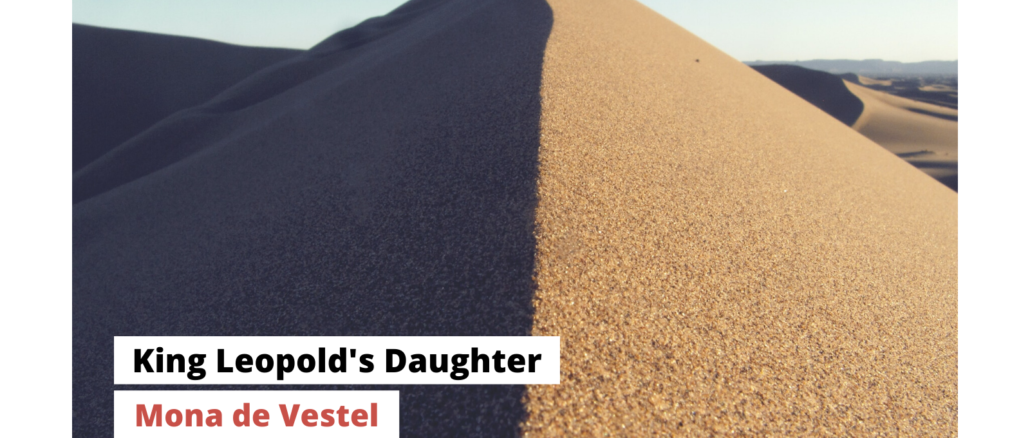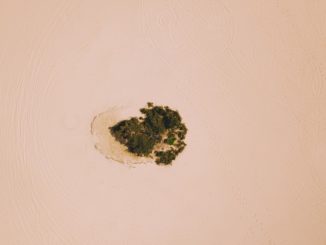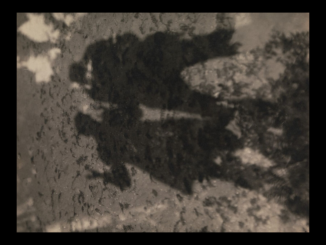
Prologue
Absence – Brussels, 1972
In the morning, they were gone. Their beds emptied, sheets still creased from the weight of their bodies. Maybe my mother cried. Maybe she gasped and screamed and knelt by the bedside in search of her children. Maybe she remained silent. It was a morning like any other. It might have rained. It might have drizzled or poured or the sky might have opened and drenched the city streets of Brussels while I slept. I slept for years. I slept for decades as I tried to remember that morning.
In the quiet dawn of an autumn day, my sister Maisha and my brother Sacha disappeared.
Weightless, they floated away. They were kidnapped.
****
He woke them in silence. First the girl, because she was the special one, then he woke the only boy of the house. The window was open. He came in the dark, didn’t knock, didn’t make himself known. He lifted her from the bed, airlifted her, or maybe he took her by the hand. He pulled the blanket back from her body, exposing her in the places where she received darkness and then waited for her to rise.
“Come with me,” he whispered.
He spoke and then waited for the black and blue curtains to stop moving.
Maisha stirred, moved and sat up and waited for clarity to return. I was sleeping nearby. I breathed, imagined hills in the infinite horizon of Belgium. The flattest land on earth where the sky loses its way hanging on a stream. Jacques Brel sang about this — the pallor of absence. No lines.
**
He walked down the hallway and opened Sacha’s door. “Rise little soldier,” my father whispered. “Come with me,” he spoke to his only boy, to this tiny 11-year-old man with his miniature soldiers and his midget tanks arranged neatly on the shelves of his room. The two made their way into the hallway where the contour of Maisha stood waiting by the door like a stain. Two children, one man. My mother and I were sleeping. The dog did not stir.
Nothing moved except their shadows. They inched into the corridor. Inch by inch. Shadow by shadow. The hallway was narrow. The wooden floor creaked. He had packed a bag for them. One small bag. No underwear for my sister, a dress. A shirt and pants for my brother. Small shoes. No toys.
He pulled the door of our apartment closed. Doors sometimes remain opened. He pulled it shut. They ran ahead of him, down the spiral of the stone staircase, coiling down towards the streets. They ran, no, they flew. Starlings flying out of the nest. One strong, one weak. Both wounded in their differences. She dark, he light. Our father between them. “Hold my hand,” he took hers, kept his at bay. Boys should not hold men. They drove in darkness. Crossed the city to the other side and to the marble palace of reverence. A kingdom really. A magical place with heavy doors and servants and the hushed voices of secrets. The city of Brussels died for one night. The city slumbered and later it would rise again. Slick streets after rainfall. changing lights with no one to wait for them. Crossroads with no one to meet. My father drove them to my grandmother’s house on the other side of town. “You will stay here.” He told my brother. “Stay here while your sister and I travel the seas.” He took her on a ship.
Amsterdam – The picture was taken after everything had already happened. They are walking the ship’s bridge, their feet tapping on the wet, slick surface. My father is half smiling, half, caught between surprise and desire. Maisha is tall for her age. She’s fourteen. A tall girl, with tired eyes, dark circles in the place where melanin has pooled. It is the fate of mixed girls everywhere when Europe meets the colony. Maisha’s hair is wild; curls in the places where knots form. His red-knuckled hand is holding hers. She is not smiling. They are both headed off the ship. They own nothing. No luggage or belongings. No possessions.
Home on the Sand Hill – Kinshasa, Spring 1971
When I was five years old, I lived at the end of a road, on the side of a hill, in Kinshasa, Zaire. Each day after my Tutsi mother had given me a bath and my Belgian father had kissed me goodnight, I would sneak out and go to the end of the road. I always arrived clothed; sometimes my hair was pulled into two ponytails, or parted in the middle, like a movie star. I would remove my nightgown slowly, carefully pulling it over my head so that I would not make my hair look wild, and then with great precision, I would take off my underwear without getting it caught in my white leather sandals. There is sand in your underpants my mother told me one day when I came home. Where did you get sand in your underpants? The sand hill became the quietest place on earth.
One day, a snake entered the house. It was the largest snake anyone had ever seen: three feet long.
My father went out to the garage cautiously; finding no weapons, he started the car and waited for our domestic Joseph to capture the animal inside our house. When he did, Joseph carried it in a large wicker basket, released it on the road and waited for the serpent to uncoil. I stood on the side of the same road and watched as my father drove his Mercedes Benz over the hot asphalt. Joseph cheered eagerly.
“Allez Missieur! Allez!”
My father had never looked more focused and for a second I wondered if I had done something wrong. The car began to move slowly and deliberately towards the snake’s undulating body. As it reached it, my father slowed way down and drove across the animal. The snake did not stop moving. It coiled, uncoiled in the place where it had been hit and, collapsed and became red as the two ends struggled for a moment trying to make sense of the severance. That night I returned to the sand hill and pushed my feet deep inside, waiting for the scorpions to come.
I often spent my days missing my older brother and sister, Sacha and Maisha, who were both away at boarding school in England. I was too young to be sent away my mother said and so I stayed with my parents while my brother played cricket with the boys and my sister found a way to brush her nappy hair with a thin plastic comb. When she went away to school, Maisha was given a brush just like her blond schoolmates and a large brown bear she carried on the plane. I still have a picture of my brother and my sister in that moment. They are both wearing grey wool suits, with shorts like Joseph’s only theirs were cut for colder climates, their clothes reflecting the sky of England. In the picture they are smiling, especially Maisha with the large bear pressed hard against her open face. My brother is crushed beside her; his smile is not as generous. They are sitting together for the camera, closer than they would ever sit in real life.
On the days when I visited the hill before dusk, I enjoyed the feel of the sun on my skin. The way it would warm me at first, and then, always, burn with insistence. My mother told me to stay covered, to keep myself hidden. I was not like the other, darker children of the city. I should not expose my skin to the sun. She told me to stay inside. Stay inside stay inside where everything is cool and light.
The night the thieves broke into our house, we were away at a cocktail party. My mother wore a long sequined silver dress that offset her brown skin. Her hair was up in an elaborate bun with languorous curls dangling along the sides of her face and when she turned, I could follow the line of her spine all the way down her naked back.
We returned from the party in a caravan of Mercedes. We returned in darkness. When we entered, we knew something was wrong. Texan, our Irish Setter, was not in his usual place. “Something has confined the dog,” my father said, “someone has confined the dog.” We walked into our house, torn up and empty. “They stole my clothes,” my mother said, “they stole my jewels.” A topaz ring had vanished. I went to bed and I waited for the robbers to return. In the dark I heard the trapped insects falling inside the cans of paraffin the domestics had placed at the foot of our bed. They cannot get you.
The next morning the house felt empty. Joseph had vanished and did not return for three days. When he did, my father cornered him in his study.
“Where were you? Who are the thieves?”
“Missieur, mais Missieur,” Joseph answered like a caricature of a scared slave boy. “Je ne sais pas qui vole la maison.” He spoke in broken French; his legs looked skinnier than ever.
“I don’t know why you insist on wearing this white suit, Joseph,” my mother said to him that night. But he came in that morning at breakfast carrying the pitcher of orange juice in full domestic garb: his white starched jacket with the gold buttons, the matching shorts, the white gloves and no shoes. When I saw his bare feet on the cool floor I thought of the scorpions my mother warned me about, but then I remembered that they lived only on the sand hill where I would travel again.
The night of the party I watched my mother get ready. She sat at the large cherry wood vanity and looked at herself in the mirror. Her back was turned but I could see her reflection in the mirror. I watched as she pursed her lips while slowly applying the red lipstick, blotting on a neatly folded linen handkerchief Joseph had washed for her. And when she was done she looked very still and said nothing. In her dress, her back was bare and exposed, open to the world.
“You’re beautiful, mommy,” I said, and she smiled. When my father came in he sat next to me on the bed and observed my mother clasp her pearl necklace closed. He was too far to hold me, too close to ignore. I reached over to him pleadingly.
“It’s time for your bedtime,” my father said waiting for me to leave the room.
I was wearing my pink sponge pajamas, the ones with feet and everything. My mother had agreed to pin my hair up like hers, up on my neck, and before I got up to kiss them good night, I thought that we were both the same, my mother and I.
They carried me to the party in a blanket and told me to sleep. I closed my eyes and pretended while listening to the sounds of the night and the hum of conversations as we crossed the city of Kinshasa. After they put me to bed in a guest bedroom, I got up again and hid in the hallway that led to the living room. I crouched behind the large hibiscus plant, larger than any plant in the world, and waited. I listened to their voices, to their laughter and the clank of the drinks. When the domestic walked by on his way to the kitchen, he glanced my way and gave me a smile.
“Midmoiselle, go to sleep! Madame will be angry with you.” I giggled, covering my mouth, and stopped because I could not hear my own voice above the music.
I made my way to the edge of the living room. No one could see me because they were absorbed by everything around them. My Aunt Daniele who wore a mini dress was lying on her stomach on an inflated armchair, playing with a single strand of her hair and laughing. My uncle Jean-Marie was sitting behind her holding a needle in his hand. “Hold still or I’ll stick you.” Her giggle became louder until that was all I could hear. I held my breath and when I sucked air in again, I heard nothing. He lowered the needle and it entered her skin. “The good doctor is in and he’ll take care of you.”
Our hosts’ domestic wore shoes that night. I saw how he hated to wear them. He said it hurt his feet. They were shiny and new, crisp and stiff like clown shoes. His legs were stick figure limbs and when I looked again, I saw that he had forgotten to wear socks.
My father stood at the center of the room and addressed everyone. “I would like to sing for you,” he said and all grew very still. My mother, who had been absent until then, appeared suddenly in my field of vision holding a drink in her hand. She kept her eyes on him and for a moment, she became invisible and only I could see her, the way she had become – beautiful and transfixed. Later, this would become my understanding of passion.
Everyone could see my father. No one saw me. He wore sideburns and his hair was combed back in a slick fashion. In the space below his partially opened shirt, a few hairs peeked out as he started to sing. He cleared his throat and a record began to play. It was my father’s record, the one he had produced, only this was the version without the lyrics. Jean-Marie stood, his arms crossed on his chest, looking at my father from across the room. He no longer held a needle in his hand. Daniele was still sitting on the armchair, but now she was upright like a doll, and all the guests stood still and waited for my father’s voice to resound. He had a deep baritone, only I did not know this, so I thought he sounded full and loud and throaty the way people with attention get when everyone is looking at them. For a moment, I imagined myself up there instead of him and their eyes on me. Everyone would have their eyes on me and I would be able to show them that I too could sing. When the song ended they clapped, and the servant began walking around the room again carrying the silver tray of drinks and winking at me every time he passed.
I knew I had to use the trick I had learned if I was going to stay around for the party. I took a deep breath and walked into the living room while rubbing my eyes. I waited for someone to see me. I knew I needed to look disoriented, fragile somehow otherwise I would be sent back immediately.
“Look! Mona! What is she doing here?”
People began talking to me.
“Honey, what are you doing? You can’t sleep?”
I shook my head. “No.”
I knew I only had a sliver of time before the possibility for this charade would vanish. I walked over the couch where my mother was engrossed in conversation with a man I had never seen. She was sitting on the edge of the couch, as if she were only planning on staying for a short while. Her legs were crossed and twice I caught the man looking at them. She wore high heels, white crocodile leather. And when she saw me, the ash from her cigarette had formed again long and narrow and fragile, ready to fall. I stood and smiled at her and instead of being angry, she smiled back. Immediately I crossed my arms across my chest and jumped right into the routine. I had seen an advertisement on television months earlier and I had learned it by heart. It had struck me as funny at the time, the cadence of the man’s voice, the way he repeated this jingle over and over again only to sell a rheumatic belt that warmed people’s backs when they ached. One day, I recited it in the same voice as the man’s and everyone “oohed” and “aahed” and clapped and exclaimed how adorable I was. This was my trick. I’d developed and mastered it. All the way to the last moment in the ad when the man crossed his arms on his chest and exclaimed while sitting comfortably on a couch. “I already knew that.” The words I recited had lost all meaning but I held on to them because it was my get-out-of-jail-free card. I began the routine and people gathered around me in a circle, each exclaiming something about my performance.
“Oh, look how adorable she is! Her little legs crossing like an adult. Oh my God, is she not the cutest thing you have ever seen?!”
I was on the couch now next to my mother’s conversation partner. He was not looking at my mother’s legs anymore. He looked at me and when he did he smiled.
“OK. Missy, you really should go to bed now.” Everyone began to clap and I knew that I needed to remember that feeling for a long time.
Imagine my hill at the edge of a road. Imagine a city, Kinshasa, a recent Belgian colony made independent nine years earlier. Imagine my white Belgian father, an architect waiting to make deals with one of the cruelest dictators of our times: Mobutu Sesseseko. Imagine my metisse mother, born as a simple brown girl in Burundi, now the queen of the continent, thanks to papa. Imagine me, a four-year-old brown girl, waiting for the sun to set to sneak out of the house to my castle at the end of a road, on the side of a hill.
A week after our robbery, my father came home from a long meeting with the architects and asked Joseph for a drink. The domestic delivered his request on a silver platter and left without being seen.
“Thierry had to toss him in the river,” my father sipped his scotch slowly. My mother held her cigarette between two fingers, and for a long time she said nothing.
“You mean, he died?” she finally asked after the ash fell on the ground.
“Yes, the dog killed him in the courtyard and nothing could be done.”
One of my father’s friend, Thierry who was the CEO of a large Belgian company in Kinshasa, had a German shepherd named Chewy. The first time I came onto his property, beyond the black gate and the steeple spikes that kept outsiders out, I saw that Chewy was almost as tall as I was. I’d never feared dogs but this animal was different. He came up to me urgently, like I had something he needed, and before Thierry yelled at him to back off, he managed to sniff me quickly, placing his snout on my cheek without even reaching or jumping.
“He grabbed him by the throat and once he got him, he wouldn’t let go.”
My father had sensitive skin that turned at the contact with sun. I watched his throat, the red of it, like a cock’s crown. I knew what it would feel like between my fingers if I had a chance to pinch it. But the dead man’s throat was not the color of my father’s. Black skin. I imagined it, the blood, spilling in the courtyard. Thieves should not be protected. My mother listened, her cigarette consuming itself between her fingers.
“He had to roll him into a rug, and I think he carried him in the trunk of the car.”
I pictured, this, the body folded in half, rolled up, a corpse, no longer useful. It wasn’t the first time a domestic had traveled with luggage and groceries. On the way back from the market, Thierry always asked his servant to travel in the trunk. “The car should not be soiled.” And now that a man had died, a rug was added to prevent blood from staining the lining.
They say the river Congo is a wild river that can swallow thousands of corpses and render them invisible. When his body landed in the water, he became a speck and then nothing. He was swallowed.
I returned to the sand hill every day. I was always alone until the children came. When they arrived, I was wearing my pretty yellow dress, yellow and blue with a knot in the back. I wore the sandals my mother told me to keep on at all cost. No child of mine should walk around barefoot, not here, not in this country. They encircled me at first and laughed, pointing at my shoes, pointing at my dress. I saw that they were naked. Soon, we forgot about my clothes, about their nakedness and ran and played and ran and played until the sun began to set. Too dark to pass for white, too light to pass for black. I forgot about my difference from the children. When light fell, I began to feel burdened by the weight of my shoes. My hair was tied, held back in ribbons and when we reached the sand hill together, it came undone. Then I removed my dress, took off my underpants and ran in the cooling sun. This is when I saw him. Thierry’s car drove slowly with the tinted windows rolled up. I couldn’t see his face but I felt his eyes on me. The car inched up and stopped and then the driver’s window rolled down. Alone in the car, Thierry leaned out towards me pressing his arm against the side of the window and I watched the constriction of his red skin against the metal of the car. I could not see his eyes but I could feel them on me — his large sunglasses covered his face, the tip of his curling red mustache reaching for them.
“Mona, get inside the house and get dressed.”
I stood and the children stopped playing and looked at Bwana Thierry with seriousness I had never seen in children before. I could feel the place between my legs, the burning of it and when the car drove away they all jumped up in unison.
“Do you ride in that car? Do you ever ride in there?” Mongrel children ride in the backseat. I ran inside and never saw them again.
Thierry’s house existed on the corner of our street, at the very end, before the sand hill. This is where I waited for the children to return. Children will return here and I would wait by the gate and place my hands between the bars where Chewy, the guard dog, could sniff me. “If he sniffs you, he will not bite,” Thierry said to me the first time I entered the compound. This is what we called it back then, large properties guarded by gates with a Mercedes parked in the carport. Does the dog know I am not white? When the Bwana was not home, the domestics would sit in the front and honk the horn. On market day, they rode in the trunk.
The night after the robbery, a kitten wandered onto our property and I ran to greet him. The kitten was small and puny and its eyes were crusted together with puss. When I scooped him up, placing my head under its belly, I felt its tiny ribs and bones pointing against its warm and soft fur. I pressed its body against mine and carried it to the highest point in the house. The kitten was very still and when I approached the window it began to squirm, wriggling like a worm. There was nothing the kitten could do to get away from me, and yet it tried. I pressed my fingers tighter around its body, constricting it making it only grow more frantic. This was my parents’ room. The bed was large and well made. Joseph was meticulous even if my father thought he was lazy. I walked over to the window and opened it. I pressed my body against the wall and stood on my tiptoes. It was one of those large colonial windows with the ‘moustiquaire’ attached to the frame and when I pulled it, the whole thing opened and I could feel the wide open space below me. I placed the kitten on the edge of the window and let it walk slowly along so that it could see where it was. This seemed to make it calmer, to bring it to some kind of peaceful place even though the void was only inches away and its tiny feet brushed up against the precipice. When I leaned over and looked down I saw everything I had always known only nothing looked the same. The flowers were in bloom as they had always been only now the Hibiscus bush that had been larger than the tallest person I knew looked small and puny, like a tuft of grass. I had become the largest thing I knew. The largest vantage point from which the world could be touched. I could see all the way to the corner of the property, all the way to the black gate with the spikes at the top that had been welded that way to keep strangers away. I could see above this and into the pot-holed street where our caravan of cars traveled collectively for safety. I searched for the sand hill at the end of the road but I could not see it. When I squinted to bring the world into focus, I saw that it only got smaller and then vanished.
My mother had told me about the magic of kittens. Their ability to land on their feet, no matter what. The world below seemed so small, so far away and I had to know if the kitten’s powers were true. I held it tightly in my hand again, circling the middle of its body between my index and thumb and I held it there for a few seconds before releasing it to the void below. I heard a yelp, a tiny strange ‘meow’ and then the kitten was falling. I kept my eyes open though I wanted to close them. And then it happened — the magic my mother said was true. The kitten landed. For a moment — nothing — and when the pull of gravity had passed, the animal began to move again and ran under the thick branches of the hibiscus tree and I never saw it again.
I returned to the sand hill every day and every day I took off my clothes slowly in the setting sun. There was silence at dusk at the end of our street. I heard nothing but the sound of Chewy’s distant bark.
As an immigrant of mixed Belgian and Tutsi descent, Mona de Vestel brings a unique perspective on the dialogue on race and the post-colonial experience. She grew up in Brussels and moved to the United States at the age of 13. After completing her degrees in Arabic (Georgetown University) and MFA in Creating Writing (Goddard College,) she taught writing at the State University of New York (Oswego & Utica). In addition to teaching and writing, she has also written and directed her one-woman show about healing from cancer and performed in a two-year production of Ping Chong’s Cry for Peace: Voices from the Congo, a unique documentary theater piece about the history of the Congo based on her own personal narrative and that of four other people from Congo.
King Leopold’s Daughter is an exploration of the consequences of colonialism on her family in the context of the Belgian Congo. The memoir is set in her, native Belgium, Mexico, Congo and the U.S. King Leopold’s Daughter — a finalist for Restless Books’ Immigrant Writing Prize in 2017 — is part of her ongoing creative exploration of the intersections of historical and personal narrative in the context of trauma including colonialism and genocide.
Featured image: Photograph by Fabio Rose on Unsplash.



